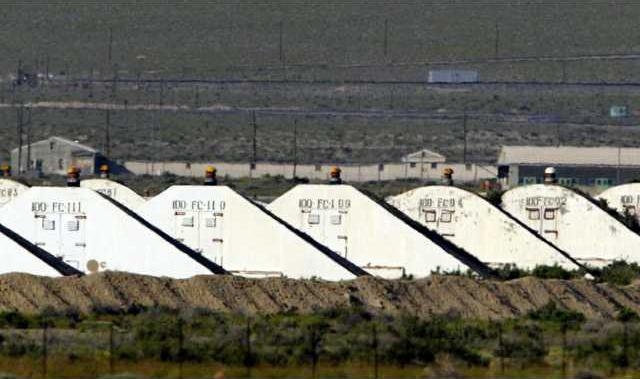HAWTHORNE, Nev. — A 60mm mortar explosion killed seven Marines and injured a half-dozen more during a training exercise in the Nevada desert, prompting the Pentagon to immediately halt the use of the weapon worldwide until an investigation can determine its safety, a military official said Tuesday.
The explosion occurred Monday night at the Hawthorne Army Depot, a facility used by troops headed overseas, during an exercise involving the 2nd Marine Expeditionary Force at Camp Lejeune, N.C. Several Marines from the unit were injured in the blast, authorities said.
The official, speaking on condition of anonymity, said it was not immediately clear whether the mortar exploded prematurely inside its firing tube or whether more than a single round exploded. The official was not authorized to speak to a reporter about the accident.
The 60mm mortar is a weapon that traditionally requires three to four Marines to operate, but it's common during training for others to observe nearby.
Renown Regional Medical Center in Reno, the area's major trauma hospital, took eight patients, including one who died, five who are in serious condition, one in fair condition, and one who has been discharged, according to spokesman Mark Earnest.
All the patients are men under the age of 30, he said. Hospital officials described their injuries as penetrating trauma, fractures and vascular injuries.
The rescue was complicated by the remoteness of the site. A helicopter ride to Reno is 41 minutes long, according to Care Flight spokesman Kurt Althof, and the distance is 2 ½ hours by car. Small hospitals in rural Nevada aren't prepared to accommodate mass casualties.
The identities of those killed won't be released until 24 hours after their families are notified.
"We send our prayers and condolences to the families of Marines involved in this tragic incident," said the force's commander, Maj. Gen. Raymond C. Fox. "We mourn their loss, and it is with heavy hearts we remember their courage and sacrifice."
The Marine Corps official said an explosion at the point of firing in a training exercise could kill or maim anyone inside or nearby the protective mortar pit and could concussively detonate any mortars stored nearby in a phenomenon known as "sympathetic detonation."
The official did not know whether the seven dead Marines and several others who were hurt were in the same firing pit, standing nearby for training observation or in an adjoining mortar pit, but any of those situations would have been them in danger after such an explosion.
The official said a worldwide moratorium after such an accident is not unusual and would persist until the investigation determines that the weapon did not malfunction in ways that would hurt other Marines or that mortars manufactured at the same time as the one involved in the accident were safe to continue to use.
The official said it would be normal to warn other U.S. military branches that use 60mm mortars, such as the Army, about the Marines warning. The moratorium could last for weeks or months.
The investigation will focus on whether the Marines followed procedures to properly fire the weapon, whether there was a malfunction in the firing device or in the explosive mortar itself, the official said.
The Hawthorne Army Depot stores and disposes of ammunition. The facility is made up of hundreds of buildings spread over more than 230 square miles.
Hawthorne has held an important place in American military history since World War II when it became the staging area for ammunition, bombs and rockets for the war. The Nevada Division of Environmental Protection says that the depot employed more than 5,500 people at its peak. Nevada was chosen for the location because of its remoteness in the wake of a devastating explosion at the government's main depot in New Jersey in the 1920s.
It opened in September 1930 as the Naval Ammunition Depot Hawthorne and was redesignated Hawthorne Army Ammunition Plant in 1977 when it moved under the control of the Army, according to its website. In 1994, the site ended its production mission and became Hawthorne Army Depot. The site currently serves several purposes for the military, including storing ammunition and explosives and providing what the military calls an ideal training facility for special forces preparing for deployments to similar desert terrain in places like Afghanistan.
Nevada and North Carolina political leaders expressed their sympathy.
Senate Majority Leader Harry Reid, D-Nev., gave his condolences to victims of the explosion during a Tuesday morning speech on the Senate floor.
Nevada Republican Sen. Dean Heller tweeted, "Thoughts and prayers are with the families who lost a loved one in the Hawthorne Army Depot explosion. Grateful for their service."
"The men and women who work and train there put service ahead of self each and every day," Republican Nevada Gov. Brian Sandoval said in a statement. "Kathleen and I wish to extend our deepest sympathies to those killed and their families."
"I was so saddened to learn about the seven Marines from Camp Lejeune who were killed last night in Nevada," U.S. Sen. Kay Hagan, D-N.C., said in a statement. "My thoughts and prayers are with the families of the Marines who were killed and those who were injured, and I will continue to monitor the investigation so we can find out what happened and take appropriate steps."
___
Bridis reported from Washington. Associated Press writers Pauline Jelinek in Washington and Michelle Rindels and Ken Ritter in Las Vegas contributed to this report.

